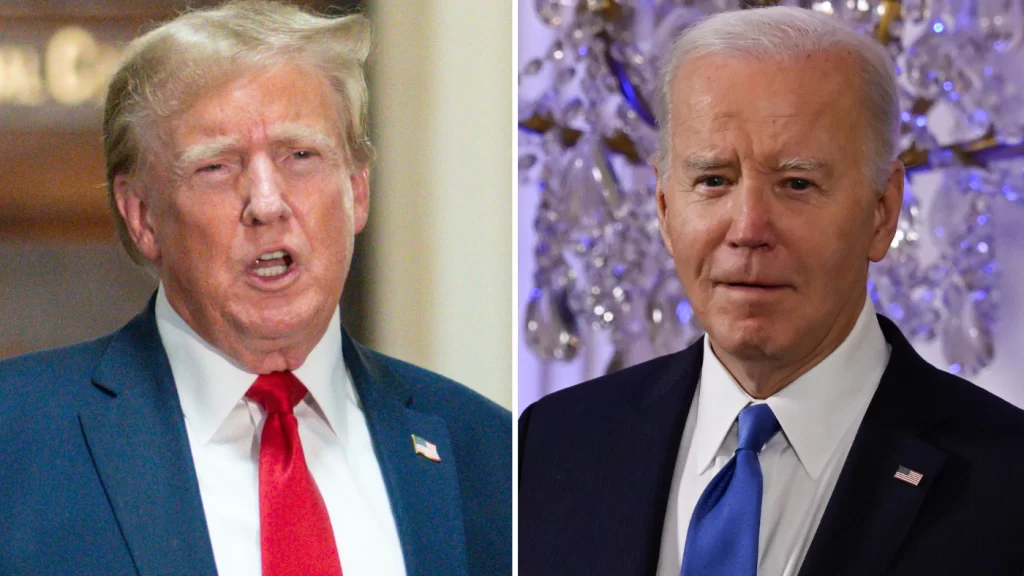
On Tuesday, President Joe Biden and Donald Trump both clinched their parties’ nominations for the presidency, setting the stage for a highly anticipated rematch in the general election.
This outcome, long anticipated by many, was confirmed as they surpassed the delegate thresholds required for their respective parties’ nominations, as reported by the BBC.
The primaries held on Tuesday across four states, one American territory, and among Democrats living abroad solidified this rematch for US voters, echoing the 2020 presidential contest.
Biden secured a crucial number of delegates for the Democratic National Convention with a victory in Georgia, closely followed by Trump, who sealed the Republican delegates needed with a win in Washington State. The Associated Press swiftly projected victories for both candidates in Georgia, Washington, and Mississippi, with Hawaii gearing up for its GOP caucuses.
With the general election looming, Trump and Biden have already begun exchanging blows on key issues such as immigration, the economy, abortion, and questioning each other’s suitability for office.
In what resembled a campaign kickoff, Biden’s recent State of the Union address aimed to allay concerns about his age and energize segments of the Democratic base less enthusiastic about the upcoming election.
Meanwhile, Trump’s campaign underwent restructuring this week, assuming control of the Republican National Committee and streamlining operations by dismissing numerous staff members in a bid to align with Biden’s formidable fundraising efforts.
Biden is targeting Trump’s stance on abortion and his disregard for various international agreements, while also highlighting Trump’s efforts to overturn the results of the 2020 election as a unique threat to American democracy.
“Donald Trump is running a campaign of resentment, revenge, and retribution that threatens the very idea of America,” Biden said in a statement Tuesday after winning the nomination.
Trump is leveraging voters’ dissatisfaction with Biden’s management of the economy and the southern border. Meanwhile, he’s gearing up for his initial trial in various pending criminal cases.
READ ALSO: Nikki Haley Drops Out of Presidential Race, Setting Up Trump-Biden Rematch
These legal battles have energized the GOP but might make swing voters hesitant.
“Our nation is failing. … We’re going to turn it around,” Trump said in a video posted to social media late Tuesday.
The turnout disparity between general elections and primaries complicates the interpretation of Tuesday’s results for November. However, the Georgia vote, a pivotal swing state where both candidates campaigned, provides insights into the political strengths and weaknesses of Trump and Biden.
Former U.N. ambassador Nikki Haley, who withdrew from the GOP primary last week, garnered closer support to Trump in certain Atlanta-area counties where Democrats held significant advantages in 2020.
However, a substantial portion of her support was registered before Tuesday. By Tuesday night, with approximately 78 percent of the statewide vote tallied, Haley only secured 5 percent of Election Day voters’ support, compared to 21 percent among early voters.
Biden aimed to secure 1,968 delegates for the Democratic convention this summer, while Trump sought 1,215 delegates for the Republican National Convention nomination. Many delegates were allocated last week during Super Tuesday when 15 states voted simultaneously.
Following a primary campaign that took candidates across the nation to states like Iowa, South Carolina, and California, the general election is anticipated to focus primarily on battleground states such as Pennsylvania, Michigan, Wisconsin, Georgia, Arizona, and Nevada, possibly with the inclusion of North Carolina. In 2020, Biden carried six of these states, narrowly losing North Carolina to Trump.
However, recent polling indicates Trump’s lead in numerous battleground states and nationally, with Biden confronting dwindling approval ratings.
“Biden’s biggest challenge is consolidation of the base,” Democratic strategist Joel Payne said. “Obviously, Biden is going to do a pretty robust outreach to moderates and Republicans — but the first thing he needs to do is consolidate his base.”
Biden has endeavored to portray the election as a choice between two starkly different presidents, aiming to emphasize Trump’s record as much as his own. During last week’s State of the Union address, Biden repeatedly referred to “my predecessor” as he critiqued Trump across various issues such as abortion, taxes, trade, and healthcare.
At 81, Biden has recently addressed concerns about his age more openly, often highlighting that Trump, at 77, is not significantly younger. His campaign has also intensified efforts to underscore the contrast with Trump in television advertisements, launching a $30 million campaign push last week.
Trump’s campaign had long anticipated securing the GOP nomination by March 19 at the latest. Many viewed his nomination as inevitable since the Jan. 15 caucuses in Iowa, which initiated the nomination process and dashed competitors’ hopes with Trump’s commanding 30-point victory.









Leave a Reply